【英语】广西钦州市钦州港经济技术开发区中学2016届高三上学期第一次月考
- 格式:doc
- 大小:36.92 KB
- 文档页数:14
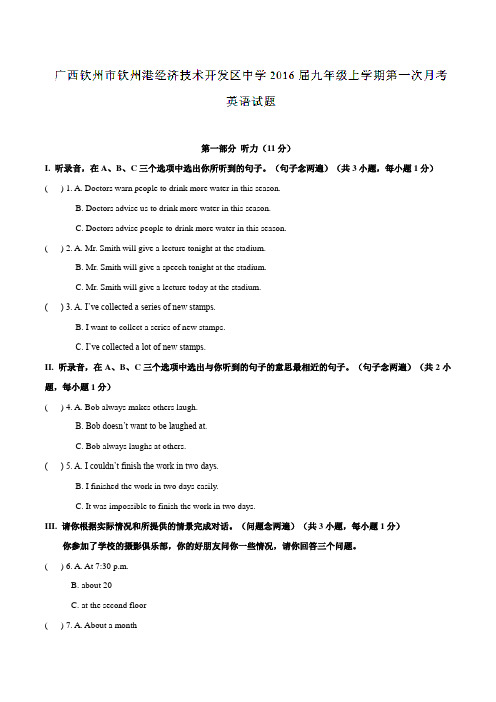
第一部分听力(11分)I. 听录音,在A、B、C三个选项中选出你所听到的句子。
(句子念两遍)(共3小题,每小题1分)( ) 1. A. Doctors warn people to drink more water in this season.B. Doctors advise us to drink more water in this season.C. Doctors advise people to drink more water in this season.( ) 2. A. Mr. Smith will give a lecture tonight at the stadium.B. Mr. Smith will give a speech tonight at the stadium.C. Mr. Smith will give a lecture today at the stadium.( ) 3. A. I’ve collected a series of new stamps.B. I want to collect a series of new stamps.C. I’ve collected a lot of new stamps.II. 听录音,在A、B、C三个选项中选出与你听到的句子的意思最相近的句子。
(句子念两遍)(共2小题,每小题1分)( ) 4. A. Bob always makes others laugh.B. Bob doesn’t want to be laughed at.C. Bob always laughs at others.( ) 5. A. I couldn’t finish the work in two days.B. I finished the work in two days easily.C. It was impossible to finish the work in two days.III. 请你根据实际情况和所提供的情景完成对话。
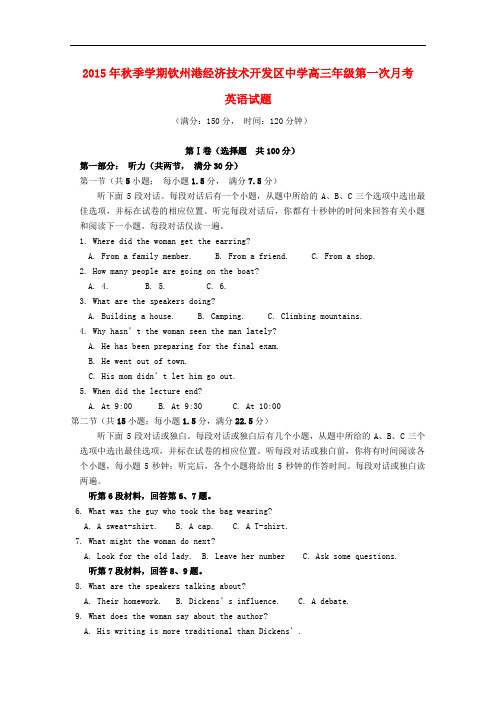
2015年秋季学期钦州港经济技术开发区中学高三年级第一次月考英语试题(满分:150分,时间:120分钟)第Ⅰ卷(选择题共100分)第一部分:听力(共两节,满分30分)第一节(共5小题;每小题1.5分,满分7.5分)听下面5段对话。
每段对话后有一个小题,从题中所给的A、B、C三个选项中选出最佳选项,并标在试卷的相应位置。
听完每段对话后,你都有十秒钟的时间来回答有关小题和阅读下一小题。
每段对话仅读一遍。
1. Where did the woman get the earring?A. From a family member.B. From a friend.C. From a shop.2. How many people are going on the boat?A. 4.B. 5.C. 6.3. What are the speakers doing?A. Building a house.B. Camping.C. Climbing mountains.4. Why hasn’t the woman seen the man lately?A. He has been preparing for the final exam.B. He went out of town.C. His mom didn’t let him go out.5. When did the lecture end?A. At 9:00B. At 9:30C. At 10:00第二节(共15小题;每小题1.5分,满分22.5分)听下面5段对话或独白。
每段对话或独白后有几个小题,从题中所给的A、B、C三个选项中选出最佳选项,并标在试卷的相应位置。
听每段对话或独白前,你将有时间阅读各个小题,每小题5秒钟;听完后,各个小题将给出5秒钟的作答时间。
每段对话或独白读两遍。
听第6段材料,回答第6、7题。
6. What was the guy who took the bag wearing?A. A sweat-shirt.B. A cap.C. A T-shirt.7. What might the woman do next?A. Look for the old lady.B. Leave her numberC. Ask some questions.听第7段材料,回答8、9题。
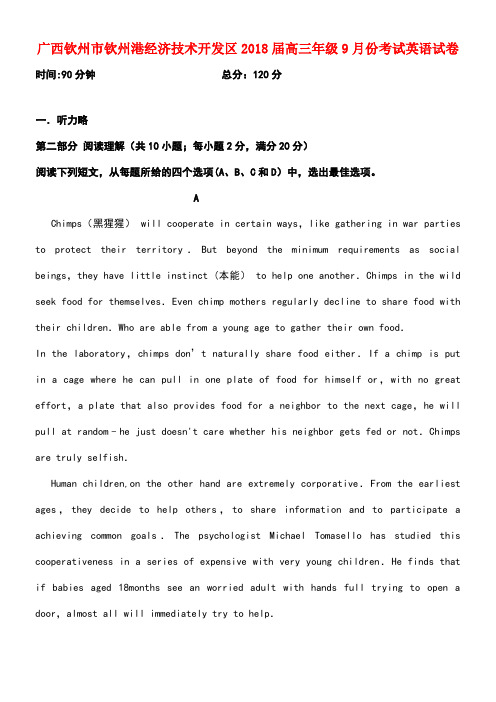
广西钦州市钦州港经济技术开发区2018届高三年级9月份考试英语试卷时间:90分钟总分:120分一.听力略第二部分阅读理解(共10小题;每小题2分,满分20分)阅读下列短文,从每题所给的四个选项(A、B、C和D)中,选出最佳选项。
AChimps(黑猩猩) will cooperate in certain ways,like gathering in war parties to protect their territory.But beyond the minimum requirements as social beings,they have little instinct (本能) to help one another.Chimps in the wild seek food for themselves.Even chimp mothers regularly decline to share food with their children.Who are able from a young age to gather their own food.In the laboratory,chimps don’t naturally share food either.If a chimp is put in a cage where he can pull in one plate of food for himself or,with no great effort,a plate that also provides food for a neighbor to the next cage,he will pull at random﹣he just doesn't care whether his neighbor gets fed or not.Chimps are truly selfish.Human children,on the other hand are extremely corporative.From the earliest ages,they decide to help others,to share information and to participate a achieving common goals.The psychologist Michael Tomasello has studied this cooperativeness in a series of expensive with very young children.He finds that if babies aged 18months see an worried adult with hands full trying to open a door,almost all will immediately try to help.There are several reasons to believe that the urges to help,inform and share are not taught.but naturally possessed in young children.One is that these instincts appear at a very young age before most parents have started to train children to behave socially.Another is that the helping behaviors are not improved if the children are remanded. A third reason is that social intelligence.Develops in children before their general cognitive(认知的)skills,at least when compared with chimps。
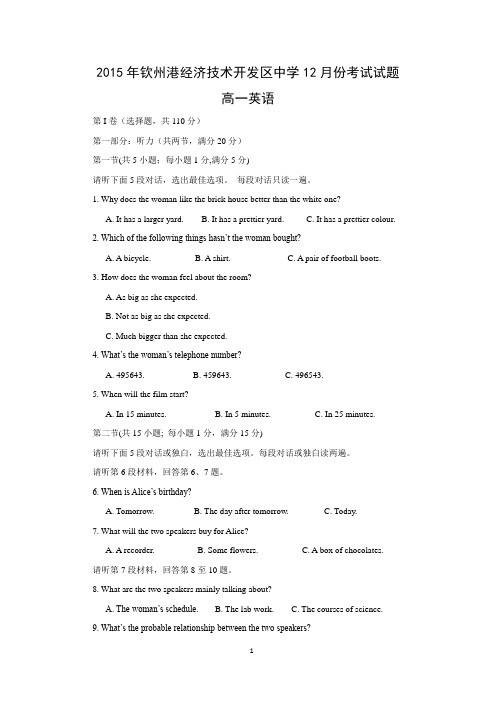
2015年钦州港经济技术开发区中学12月份考试试题高一英语第I卷(选择题,共110分)第一部分:听力(共两节,满分20分)第一节(共5小题;每小题1分,满分5分)请听下面5段对话,选出最佳选项。
每段对话只读一遍。
1. Why does the woman like the brick house better than the white one?A. It has a larger yard.B. It has a prettier yard.C. It has a prettier colour.2. Which of the following things hasn’t the woman bought?A. A bicycle.B. A shirt.C. A pair of football boots.3. How does the woman feel about the room?A. As big as she expected.B. Not as big as she expected.C. Much bigger than she expected.4. What’s the woman’s telephone number?A. 495643.B. 459643.C. 496543.5. When will the film start?A. In 15 minutes.B. In 5 minutes.C. In 25 minutes.第二节(共15小题; 每小题1分,满分15分)请听下面5段对话或独白,选出最佳选项。
每段对话或独白读两遍。
请听第6段材料,回答第6、7题。
6. When is Alice’s birthday?A. Tomorrow.B. The day after tomorrow.C. Today.7. What will the two speakers buy for Alice?A. A recorder.B. Some flowers.C. A box of chocolates.请听第7段材料,回答第8至10题。
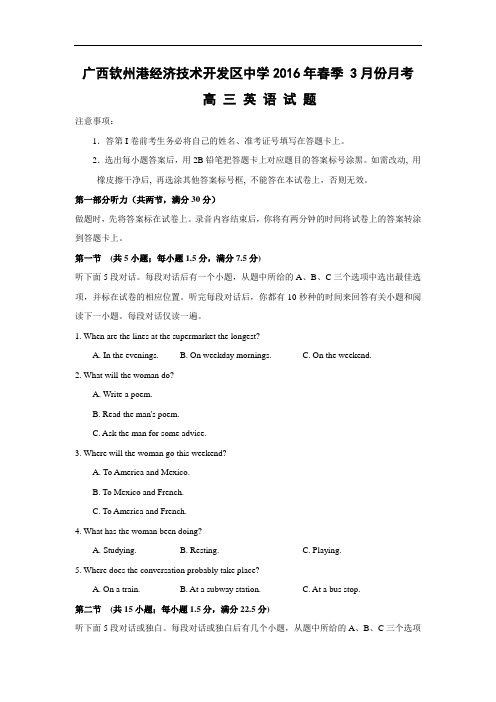
广西钦州港经济技术开发区中学2016年春季 3月份月考高三英语试题注意事项:1.答第I卷前考生务必将自己的姓名、准考证号填写在答题卡上。
2.选出每小题答案后,用2B铅笔把答题卡上对应题目的答案标号涂黑。
如需改动, 用橡皮擦干净后, 再选涂其他答案标号框, 不能答在本试卷上,否则无效。
第一部分听力(共两节,满分30分)做题时,先将答案标在试卷上。
录音内容结束后,你将有两分钟的时间将试卷上的答案转涂到答题卡上。
第一节(共5小题;每小题1.5分,满分7.5分)听下面5段对话。
每段对话后有一个小题,从题中所给的A、B、C三个选项中选出最佳选项,并标在试卷的相应位置。
听完每段对话后,你都有10秒种的时间来回答有关小题和阅读下一小题。
每段对话仅读一遍。
1. When are the lines at the supermarket the longest?A. In the evenings.B. On weekday mornings.C. On the weekend.2. What will the woman do?A. Write a poem.B. Read the man's poem.C. Ask the man for some advice.3. Where will the woman go this weekend?A. To America and Mexico.B. To Mexico and French.C. To America and French.4. What has the woman been doing?A. Studying.B. Resting.C. Playing.5. Where does the conversation probably take place?A. On a train.B. At a subway station.C. At a bus stop.第二节(共15小题;每小题1.5分,满分22.5分)听下面5段对话或独白。
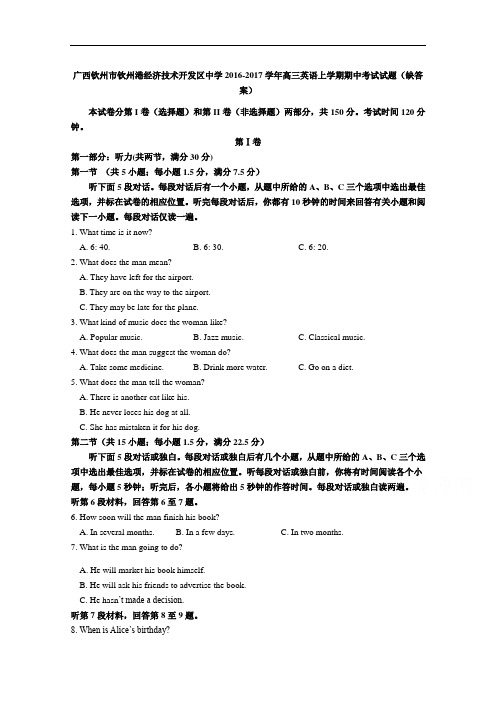
广西钦州市钦州港经济技术开发区中学2016-2017学年高三英语上学期期中考试试题(缺答案)本试卷分第I卷(选择题)和第II卷(非选择题)两部分,共150分。
考试时间120分钟。
第Ⅰ卷第一部分:听力(共两节,满分30分)第一节(共5小题;每小题1.5分,满分7.5分)听下面5段对话。
每段对话后有一个小题,从题中所给的A、B、C三个选项中选出最佳选项,并标在试卷的相应位置。
听完每段对话后,你都有10秒钟的时间来回答有关小题和阅读下一小题。
每段对话仅读一遍。
1. What time is it now?A. 6: 40.B. 6: 30.C. 6: 20.2. What does the man mean?A. They have left for the airport.B. They are on the way to the airport.C. They may be late for the plane.3. What kind of music does the woman like?A. Popular music.B. Jazz music.C. Classical music.4. What does the man suggest the woman do?A. Take some medicine.B. Drink more water.C. Go on a diet.5. What does the man tell the woman?A. There is another cat like his.B. He never loses his dog at all.C. She has mistaken it for his dog.第二节(共15小题;每小题1.5分,满分22.5分)听下面5段对话或独白。
每段对话或独白后有几个小题,从题中所给的A、B、C三个选项中选出最佳选项,并标在试卷的相应位置。
钦州市钦州港经济技术开发区中学2016年秋季学期9月份考试高三英语试卷第一部分听力1. Who is the man possibly talking to?A. A doctor.B. A teacher.C. His mother2. What do we know about Sam?A. His sister will leave for New York.B. His sister will leave for Los Angeles.C. He will leave New York.3. What is the woman going to do?A. Rewrite the paper because there are too many mistakes.B. Throw the paper away.C. Read the paper again.4. Why does the woman thank the man?A. He lent her some money.B. He gave her a five-pound bill.C. He returned her money found.5. Where does this conversation probably take place?A. At an airport.B. At a railway station.C. At a department store.6. Whom do you think the woman was angry with?A. The man.B. The repairman.C. The shopkeeper.7. Why couldn't the woman find the repair shop?A. She missed the right turn.B. The man gave her the wrong directions.C. She was a bad driver.8. Why did the man tell her to turn to these television repairmen?A. The shop w as easy to find.B. One of the repairmen was his friend.C. They did good work and the price was reasonable.9. What's the relationship between the man and the woman?A. They are teacher and student.B. They are friends.C. They are mother and son.10. What does the woman ask the man to do?A. Look for a new apartment.B. Find a job to earn $ 200 a month.C. Share an apartment with one or two roommates.11. How much does the woman want to spend on rent?A. Less than $ 200 a month.B. Somewhere about $ 200 a month.C. A little more than $ 200 a month.12. What is the woman good at?A. Swimming.B. Running.C. Playing.13. How old was she when she became famous?A. She was twenty.B. She was thirteen.C. She was fifteen.14. What can we learn about the woman from the dialogue?A. She took part in one of the Olympic Games.B. She still swims for international competitions.C. She used to swim thirty five miles every week.15. What had gone wrong in their house?A. Their washing machine.B. The electricity.C. The lights.16. Who was Mr. Smith?A. A repairman.B. The woman's husband.C. The woman's new neighbor.17. Why did the man think it would cost him dearly?A. Because he wanted to buy a car.B. Because he didn't have a good job.C. Because their car needed repairing.18. What were the students going to do?A. They were going to read their articles before a video camera.B. They were going to read news on TV.C. They were going to celebrate the writer's sister's birthday.19. Why was the writer so nervous?A. He had never stood before a video camera.B. He had never read his own article before a video camera.C. This camera was different from the one he had once faced.20. What was the writer's feelings to his class teacher?A. Nervous.B. Afraid.C. Thankful.第二部分阅读理解(共两节,满分40分)第一节(共15小题;每小题2分,满分30分)阅读下列短文,从每题所给的四个选项A、B、C和D中,选出最佳选项,并在答读卡上将该项涂黑。
广西钦州港经济技术开发区中学2016年春季学期3月分月考试卷高三英语试题注意事项:1.答第I卷前考生务必将自己的姓名、准考证号填写在答题卡上。
2.选出每小题答案后,用2B铅笔把答题卡上对应题目的答案标号涂黑。
如需改动, 用橡皮擦干净后, 再选涂其他答案标号框, 不能答在本试卷上,否则无效。
第一部分听力(共两节,满分30分)做题时,先将答案标在试卷上。
录音内容结束后,你将有两分钟的时间将试卷上的答案转涂到答题卡上。
第一节(共5小题;每小题1.5分,满分7.5分)听下面5段对话。
每段对话后有一个小题,从题中所给的A、B、C三个选项中选出最佳选项,并标在试卷的相应位置。
听完每段对话后,你都有10秒种的时间来回答有关小题和阅读下一小题。
每段对话仅读一遍。
1. When are the lines at the supermarket the longest?A. In the evenings.B. On weekday mornings.C. On the weekend.2. What will the woman do?A. Write a poem.B. Read the man's poem.C. Ask the man for some advice.3. Where will the woman go this weekend?A. To America and Mexico.B. To Mexico and French.C. To America and French.4. What has the woman been doing?A. Studying.B. Resting.C. Playing.5. Where does the conversation probably take place?A. On a train.B. At a subway station.C. At a bus stop.第二节(共15小题;每小题1.5分,满分22.5分)听下面5段对话或独白。
钦州市钦州港经济技术开发区中学2016年秋季学期9月份考试高一英语试卷注意事项:1.答卷前,考生务必用钢笔或签字笔将自己的班别、姓名、考号填写在答题纸和答题卡的相应位置处。
2.选择题每小题选出答案后,用2B铅笔把答题卡上对应题目的答案标号涂黑。
3.非选择题答案必须写在答题纸相应位置处,不按要求作答的答案无效。
4.考生必须保持答题卡的整洁,考试结束后,将答题卡和答题纸一并收回。
第一部分:听力(共两节,满分20分)第一节(共5小题;每小题1.5分,满分7.5分)听下面5段对话。
每段对话后有一个小题,从题中所给的A、B、C三个选项中选出最佳选项,并标在试卷的相应位置。
听完每段对话后,你都有10秒钟的时间来回答有关小题和阅读下一小题。
每段对话仅读一遍。
1. What is Linda?A. A writer.B. A student.C. A teacher.2. What is the man afraid of?A. Having an accident.B. Missing the interview.C. Saying something wrong.3. What does the woman want to do?A. To return a jacket.B. To change a jacket.C. To buy another jacket.4. Why does the man feel upset?A. A guy stole his clothes.B. He found his clothes ugly.C. Someone said he was ugly.5. What does the woman mean?A. She disbelieves her son.B. She feels very sorry for her son.C. She wants her son to use a new key.第二节(共15小题;每小题1.5分,满分22.5分)听下面5段对话或独白。
广西钦州港经济技术开发区中学2016年春季学期3月分月考试卷高一英语试题本试卷共三大题,满分为150分。
考试时间120分钟。
注意事项:1.答卷前,考生务必用黑色字迹的钢或签字笔将自己的姓名和考生号、试室号、座位号写在答题卡和答卷纸上。
2.选择题每小题选出答案后,用2B铅笔把答题卡上对应题目选项的答案信息点涂黑。
如需改动,用橡皮擦干净后,再选涂其他答案,答案不能答在试卷上。
3.非选择题必须用黑色字迹的钢笔或签字笔作答,答案必须写在答题卡各题目指定区域的相应位置上;如需改动,先划掉原来的答案,然后再写上新的答案;不准使用铅笔和涂改液。
不按以上要求作答的答案无效。
4.考生必须保持答题卡的整洁。
考试结束后,将答题卡上交。
第Ⅰ卷第一部分听力(共两节,满分20分)第一节(共15小题;每小题1分,满分15分)听下面5段对话。
每段对话后有一个小题,从题中所给的A.B.C.三个选项中选出最佳选项,并标在试卷的相应位置。
听完每段对话后,你都有10秒钟的时间来回答有关小题和阅读下一小题。
每段对话读两遍。
Conversation 11. What time did Mark call the man?A. At 6:00 pmB. At 6:30 pmC. At 8:00 pm2. Where was the man when Mark called?A. On the way back home.B. At home.C. At the supermarket.Conversation 23. What is the man’s plan tonight ?A. To go to a bar for a drink.B. To go to a party with the woman.C. To celebrate his daughter’s birthday.4. What’s the probable relationship between the two speakers?A. Husband and wife.B. Father and daughter.C. Workmates. Conversation 35. How did the woman look when the man saw her?A. Angry.B. Worried.C. Tired.6. Where did the conversation probably happen?A. In the woman’s house.B. In a hotel.C. In a restaurant. Conversation 47. Why did the former owner of the restaurant want to sell the restaurant?A. Because he was planning to go to the US.B. Because he wanted to go back to Australia.C. Because it is hard to run the restaurant.8. How is the restaurant now?A. Very small.B. Unpopular.C. Successful.9. What may the man probably talk about next?A. His plan for the future.B. The changes of the restaurant.C. The reason for running a restaurant.Conversation 510. In which city did the woman grow up?A. Paris.B. London.C. New York City.11. What do we know about the population of London and New York City?A. London has a larger population.B. London has a smaller population.C. The populations of the two cities are close.12. How much area does New York City probably cover?A. About 780 square kilometers.B. About 1,580 square kilometers.C. About 3,000 square kilometers.Conversation 613. What was the woman’s day like?A. DullB. Terrible.C. Great.14. Where did the woman meet the kids?A. In a park.B. In a school.C. In a garden.15. When did the man start learning English?A. In kindergarten.B. At primary school.C. In middle school.第二节(共5小题;每小题1分,满分5分)听短文填空,每个空格不得超过三个单词。
2015年秋季学期钦州港经济技术开发区中学高三年级第一次月考英语试题(满分:150分,时间:120分钟)第Ⅰ卷(选择题共100分)第一部分:听力(共两节,满分30分)第一节(共5小题;每小题1.5分,满分7.5分)听下面5段对话。
每段对话后有一个小题,从题中所给的A、B、C三个选项中选出最佳选项,并标在试卷的相应位置。
听完每段对话后,你都有十秒钟的时间来回答有关小题和阅读下一小题。
每段对话仅读一遍。
1. Where did the woman get the earring?A. From a family member.B. From a friend.C. From a shop.2. How many people are going on the boat?A. 4.B. 5.C. 6.3. What are the speakers doing?A. Building a house.B. Camping.C. Climbing mountains.4. Why hasn’t the woman seen the man lately?A. He has been preparing for the final exam.B. He went out of town.C. His mom didn’t let him go out.5. When did the lecture end?A. At 9:00B. At 9:30C. At 10:00第二节(共15小题;每小题1.5分,满分22.5分)听下面5段对话或独白。
每段对话或独白后有几个小题,从题中所给的A、B、C三个选项中选出最佳选项,并标在试卷的相应位置。
听每段对话或独白前,你将有时间阅读各个小题,每小题5秒钟;听完后,各个小题将给出5秒钟的作答时间。
每段对话或独白读两遍。
听第6段材料,回答第6、7题。
6. What was the guy who took the bag wearing?A. A sweat-shirt.B. A cap.C. A T-shirt.7. What might the woman do next?A. Look for the old lady.B. Leave her numberC. Ask some questions.听第7段材料,回答8、9题。
8. What are the speakers talking about?A. Their homework.B. Dickens’s influence.C. A debate.9. What does the woman say about the author?A. His writing is more traditional than Dickens’.B. His language is richer than Dickens’.C. He doesn’t like Dickens’ books.听第8段材料,回答第10至12题。
10. What was the woman responsible for in her last job?A. Management.B. Translation.C. Marketing.11. What benefited the woman a lot during her business trip in China?A. Her professional skills.B. Her language skills.C. Her meetings with key people.12. What does the woman like best about this job?A. Plane travel.B. Train travel.C. Salary.听第9段材料,回答第13至16题。
13. Which party are the speakers talking about?A. David’s party.B. A Christmas party.C. David’s friend’s party.14. Why were they late?A. They took a lot of time to buy a map.B. They lost their way.C. They had to work overtime.15. What made them embarrassed?A. There was hardly anyone at the party.B. They didn’t bring anything.C. They were wearing casual clothes.16. How did they feel when they left?A. Excited.B. Satisfied.C. Upset.听第10段材料,回答第17至20题。
17. Where is the Sea Ranch?A. Near the ocean.B. On a hill near San Francisco.C. Three hours south of San Francisco.18. What do we know about the houses there?A. They are all from the 1960s.B. They are environmentally friendly.C. They are made of different kinds of materials.19. What can people do at the Sea Ranch?A. Ride horses.B. Go biking.C. Go online.20. What kind of vacation can visitors expect there?A. A relaxing one.B. A modern one.C. An adventurous one.第二部分阅读理解(共两节, 满分40分)第一节(共15小题; 每小题2分, 满分30分)阅读下列短文, 从每篇短文后所给各题的四个选项(A、B、C和D)中,选出最佳选项,并在答题卡上将该项涂黑。
AThere are some strange and wonderful rules in law books around the world. When you are traveling, it’s always best to know before you go. Not only could this keep you out of trouble, but it can also help you get the most out of your holiday.1. In Victo ria, Australia, it’s illegal to change a light bulb unless you are a licensed electrician.People who disobey this law could receive a fine of up to AU$10 (£5.50).2. In Milan, Italy, citizens are required to smile at all times, except during funerals or hospitalvisits.3. In England, it is illegal to die in the Houses of Parliament. This was voted the mostludicrous law in the UK in 2007. A spokesman for the House of Commons said: “The people who know about these things here say there is no basis for such a law, not to say itdoes not exist somewhere in writing.”4. In Canada, by law, one out of every five songs on the radio must be sung by a Canadian.5. Flushing (冲洗) the toilet after 10 p.m. is illegal in Switzerland. The Government considerit noise pollution.6. Running out of petrol is illegal on Germany’s autobahn, and so is walking along it. So thosewho do break down must pull over and use their horn to attract attention. The fine is €80 (£65) for endangering other drivers.7. In Chicago, it is aga inst the law to eat in a place that’s on fire.No matter how good the pizza tastes, if the restaurant sets on fire–you can’t stick around!21. According to the text, which of the following is legal(合法的)?A. A doctor changing his bulb at his home in Victoria.B. A customer eats in a Chicago restaurant while it is on fire.C. A spokesman dies in the House of Parliament in English.D. A driver blows his horn when his car breaks down on a Germany’s highway.22. If you see a citizen in Milan isn’t smiling, he is probably _______.A. under great pressureB. visiting a friend in the hospitalC. having a quarrel with his bossD. in a bad mood23. Where will you be fined if you break the laws mentioned in the text?A. Canada and ChicagoB. England and ChicagoC. German and VictoriaD. Switzerland and Milan24. What’s the purpose of banning flushing the toilet in Switzerland after 10 p.m.?A. To avoid overusing the toilet.B. To avoid disturbing others with unpleasant sounds.C. To save energy.D. To cut the cost of waterBWhile income worry is a rather common problem of the aged, loneliness is another problem that aged parents may face. Of all the reasons that explain their loneliness, a large geographical distance between parents and their children is the major one. This phenomenon is commonly known as “Empty Nest Syndrome”(空巢综合症).In order to seek better chances outside their countries, many young people have gone abroad, leaving their parents behind with no clear idea of when they will return home. Their parents spend countless lonely days and nights, taking care of themselves, in the hope that someday their children will come back to stay with them. The fact that most of these young people have gone to Europeanized or Americanized societies makes it unlikely that they will hold as tightly to the value of duty as they would have if they had not left their countries. Whatever the case, it has been noted that the values they hold do not necessarily match what they actually do. This geographical and cultural distance also prevents the grown-up children from providing response in time for their aged parents living by themselves.The situation in which grown-up children live far away from their aged parents has been d escribed as “distant parent phenomenon”, which is common both in developed countries and in developing countries. Our society has not yet been well prepared for “Empty Nest Syndrome”.25. According to the passage, the loneliness of aged parents is mainly caused by _______.A. their earlier experience of feeling lonelyB. the unfavorable living conditions in their native countriesC. the geographical distance between parents and childrenD. the common worry about their income26. If young people go abroad, _________.A. they do not hold to the value of duty at allB. they cannot do what they should for their parentsC. they can give some help to their parents back homeD. they believe what they actually do is right27. From the last paragraph, we can infer that ________.A. the situations in the developed and developing countries are differentB. “Empty Nest Syndrome” has arrived unexpectedly in our societyC. children will become independent as soon as they go abroadD. the aged parents are not fully prepared for “Empty Nest Syndrome”CScientists investigated why Ebola virus is so deadly when it spreads from animals to humans and then from human-to-human contact. The research team looked at the Zaire Ebola virus in an animal system to understand how it gains strength. This virus is responsible for the current outbreak in West Africa. They found that initially (最初) the animal systems were not affected by the virus, but succeeding transmission (传送) into other animals caused the virus to “hot up” and become more severe.The team analyzed the viruses at different stages and were able to identify several changes in its genetic material that were associated with increased disease.Professor Julian Hiscox, who led the study from the University’s Institute of I nfection and Global Health, explains: “The work tells us that the evolutionary goal of Ebola virus is to become more fatal.”“We were able to show through genetic analysis which parts of the virus are involved in this process. The information we have gathered will now allow us to monitor for such changes in an outbreak as well as develop future treatment strategies.”Professor Roger Hewson, leading the study from Public Health England, Porton Down, said: “Ebola virus is such a destructive infection to the p eople affected by the disease and the economy of West Africa.”“Our understanding of Ebola virus biology is way behind that of other viruses and our cooperation shows how we can bring together our specialists’ skills to close this knowledge gap.”Professor Miles Carroll, a co-author of the work, said: “This study has allowed the team to be at the forefront of developing methodologies to analyze patient samples recently taken by the European Mobile Laboratory from West Africa to understand disease evolution during the current outbreak.”28. What does the first paragraph mainly tell us?A. How severe Ebola virus is.B. How Ebola virus gradually becomes deadly.C. How Ebola virus spreadsD. What contributions scientists have made on Ebola virus.29. Which of the following statements is mentioned in the passage?A. As the virus spreads, it’ll change and become more and more deadly.B. In the first stage, the virus hurts its victims much.C. The research in Ebola virus is more advanced than that in other viruses.D. The scientists have a negative attitude to the research in Ebola virus.30. The underlined word “fatal” has the closest meaning to ________.A. optimisticB. deadlyC. commonD. fantastic31. Where can we probably read this passage?A. In an advertisement.B. In a storybook.C. In a science report.D. In a textbook.DWhen people were building houses, they used to consider not only the climate of the areas but also the building materials and the fashions for their houses. However, since electricity became more and more expensive, people began to pay much more attention to the energy they could get for their houses and the new ways they could find to protect their houses from both cold and heat.Now, houses of an old yet new type have been widely built. In some parts of the world, people share their houses with their livestock (家畜).During cold weather, they gather their cows, goats, or other animals and keep them on the first floor of their houses. The reasons are that the animals can be protected from the cold and that they can help to heat the houses as well. The body heat given off by the animals rises to the second floor of the houses, where people live. By sharing their houses with their livestock, people gain a source of heat.People who live in or near cities do not usually keep livestock. However, home builders use the fact that heat rises. This natural law can be used in building houses in these areas. Instead of keeping livestock on the first floor, builders fill it with large rocks. As they are open to the sun’s rays during cold weather, these rocks take in heat. They also give off the heat, and, of course, the warm air rises into the living areas of the houses. So these houses are energy-saving.House-building becomes a great challenge to building designers and energy engineers. They try to meet this challenge by learning from old traditions and by using modern technology. And someday in the future, people will be able to live in more energy-saving houses.32. What did people begin to consider as electricity was no longer cheap?A. The climate of their areas.B. The fashions for their houses.C. The building materials for their houses.D. The energy for their houses.33. People in some areas gain a source of heat by ________.A. protecting their livestock from the coldB. keeping their livestock downstairsC. sharing their houses only with their cowsD. living on the second floor with their livestock34. The underlined words “natural law” in the third paragraph refer to the fact that _______.A. heat goes in the upward directionB. heat raises the temperature in the housesC. heat goes up if temperature is raisedD. heat increases the temperature of rocks35. From the passage, we can conclude that ________.A. people will no longer consider building materials in the futureB. almost all people will move into the houses heated by large rocksC. energy-saving buildings will become more popular in the futureD. energy engineers will devote themselves only to modern technology第二节(共5小题;每小题2分,满分10分)根据短文内容,从短文后的选项中选出能填入空白处的最佳选项,选项中有两项是多余的选项。